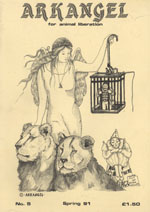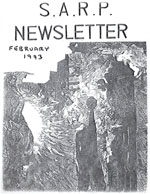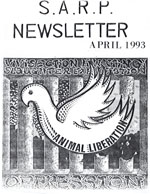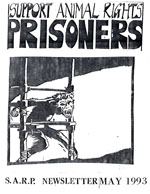The Archives
-
Periodicals
S.A.R.P. newsletters year 3
10.25.13 | PermalinkS.A.R.P. Newsletter #12-15 (1993 – Northampton, England)
Only a few short years after reforming Support Animal Rights Prisoners, the contributors to the project (primarily Barry Horne) threw in the towel. Their raison d’être was being fulfilled by the ALF SG newsletters, and Barry felt as if the group wasn’t having the unifying, inspirational impact that he had hoped for. The final issue, mostly written by press officer Robin Webb, starts off light and positive, but ends with an angry missive from Horne accusing most activists of being mere radical t-shirt collectors rather than actual radicals. Across the span of decades and beyond even his own death, this stab at those unwilling to fight for liberation still hits its mark. It is a sad ending to an information packed publication, but not every issue of this last year of SARP is so intense. Tiny fragments of our history fall off these pages like gold dust- collect them together and you have a treasure. Barry might have died on hunger strike, but he did not leave us behind. His words and actions will continue to remind us where we came from, and for whom we fight. Rest in peace, comrade, and thank you for all you have given us…
…
-
One-off publications
A Cat In Hell’s Chance
04.14.12 | PermalinkA Cat In Hell’s Chance (2002, London, England.)
In the annals of animal rights history there are but a handful of legendary campaigns still talked about by activists of all ages. The story of Hill Grove cat farm is one such fabled war, and with good reason. Hill Grove was a watershed moment for the movement and eventually led to the founding of the Stop Huntingdon Animal Cruelty (SHAC) campaign. The battles that raged there included the beating and intentional poisoning of protesters, attacks by company employees, systematic police brutality, a security bill that ran into the millions of British pounds, and eventual victory for the cats being imprisoned in farmer Chris Brown’s compound.
A Cat in Hell’s Chance attempts to document this significant stage in our movement’s development. While the book is in need of a better editor, and is at times disjointed, it does cover all of the major events involved. Including all the way back to the first protests and raids against Hill Grove in the 1980s. Lovers of animal rights history, and young warriors curious about the successful tactics developed by earlier generations, would do well to read this long out of print book.
UPDATE: If you would like a physical copy of this book, it is available through the New Zealand Anti-Vivisection Society and can be found HERE.

-
Arkangel, Periodicals
Arkangel #4,5,7
01.02.12 | PermalinkArkangel #4,5,7 (1990-1991. London, England)
Our posting of the complete Arkangel continues into the 90s with issues 4, 5, and 7. The omission of issue 6 is not an oversight- it was never printed. Arkangel was founded by Ronnie Lee, who was serving a 10 year sentence during the magazines early years, and edited by Vivien Smith, who found herself in a jail cell by the time issue #6 was scheduled for release. Sensing the possibility of shutting down this crucial publication, law enforcement in England ransacked the Arkangel office just before the layout of issue #6. It was lost to the ages, and with Vivien facing serious charges a new team of interim editors anonymously produced Arkangel #7, causing a slight decline in the publication’s overall quality.
The history covered by these three issues is tremendous. The death of Mike Hill, Animal Aid’s disastrous labeling of direct action as “terrorism,” and the return of the ALF Press Office are all reported upon, along with updates from groups around the world. Amidst the columns reporting on the actual work of activists though is a disturbing amount of debate, much of it centered on whether animal rights groups should allow participation by racists, nationalists, and separatists. The back and forth articles from one issue to the next mostly fail to recognize the most offensive nature of the argument – that there should even be an argument! It boggles the mind that anyone could see a benefit to taking on the baggage of these far right lunatics and their disgusting politics. During a decade where skinhead violence claimed the lives and dignity of so many it is particularly disheartening that some in our movement saw fit to offer these thugs a place at our table.











